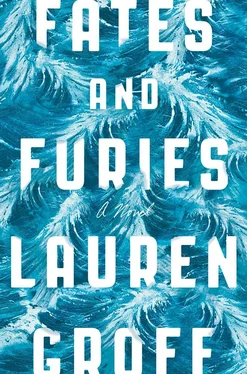When she clipped back into the house, Lotto was in the doorway, his head in his hands. He looked up at her, pale and distraught. “My mother’s dead,” he said. He wouldn’t be able to cry for another hour or so.
“Oh, no,” Mathilde said. She hadn’t thought death possible when it came to Antoinette. [So immense, what was between them, immortal.] She walked over to her husband, and he put his face against her sweaty side, and she held his head there in her hands. And then her own grief rose, a surprising sharp bolt in the temples. Now who did she have to fight? This was not the way it was supposed to go.
—
IN COLLEGE, Mathilde went once with Ariel to Milwaukee.
He had business there and she was his on the weekend, to do with what he liked. She spent most of her time shivering at the bay window of her room in the bed-and-breakfast. Downstairs: polished brass, plates of scones, walls thick with oils painted by Victorian spinsters, a woman whose flared nostrils told her what she thought of Mathilde.
Outside, snow had fallen thigh-deep in the night. The plows had swept the street snow into mountains bordering the sidewalk. Something was deeply soothing about so much untouched white.
Mathilde watched as down the street came a little girl in a red snowsuit with purple racing stripes. Mittens, a cap too big for her head. Disoriented, the girl turned around and around and around. She began to climb the snow mountain that blocked her from the street. But she was so weak. Halfway up, she’d slip back down. She’d try again, digging her feet deeper into the drift. Mathilde held her breath each time, let it out when the girl fell. She thought of a cockroach in a wineglass, trying to climb up the smooth sides.
When Mathilde looked across the street at a long brick apartment complex taking up the whole block, ornate in its 1920s style, she saw, in scattered windows, three women watching the little girl’s struggles.
Mathilde watched the women as they watched the girl. One was laughing over her bare shoulder at someone in the room, flushed with sex. One was elderly, drinking her tea. The third, sallow and pinched, had crossed her skinny arms and was pursing her lips.
At last, the girl, exhausted, slid down and rested, her face against the snow. Mathilde was sure she was crying.
When Mathilde looked up again, the woman with crossed arms was staring angrily through all the glass and cold and snow directly at her. Mathilde startled, sure she’d been invisible. The woman disappeared. She reappeared on the sidewalk in inside clothes, tweedy and thin. She chucked her body into the snowdrift in front of the apartment building, crossed the street, grabbed the girl by the mittens and swung her over the mountain. Carried her across the street and did it again. Both mother and daughter were powdered with white when they went inside.
Long after they were gone, Mathilde thought of the woman. What she was imagining when she saw her little girl fall and fall and fall. She wondered at the kind of anger that would crumple your heart up so hard that you could watch a child struggle and fail and weep for so long, without moving to help. Mothers, Mathilde had always known, were people who abandoned you to struggle alone.
It occurred to her then that life was conical in shape, the past broadening beyond the sharp point of the lived moment. The more life you had, the more the base expanded, so that the wounds and treasons that were nearly imperceptible when they happened stretched like tiny dots on a balloon slowly blown up. A speck on the slender child grows into a gross deformity in the adult, inescapable, ragged at the edges.
A light went on in the mother and daughter’s window. In it the girl sat down with a notebook. Her small head bent. After some time, the mother put a steaming cup beside the girl, and the girl picked it up and cradled it in both hands. In Mathilde’s mouth came the forgotten sweet-salty taste of hot milk.
Perhaps, Mathilde thought, watching flakes fall into dark and the empty street, I’ve been wrong. Perhaps the mother had watched her daughter fail and fail and didn’t move to help out of something unfathomable, something Mathilde struggled to understand, a thing that was like an immense kind of love.
—
AT MIDNIGHT ON THE DAY Mathilde shoved the dog away from her into a new life with the little family, she woke to find herself outside in the overcast night, no glim of moon, the pool a tar pit. Still wearing the floor-length ivory sheath, she found herself screaming for the dog.
“God!” she was shouting. “God!” But the dog was not skittering back to her. There was no noise, all still and lightless and watchful. Her heart began to pound. She went in, calling, “God? God?” She looked in all the closets, under all the beds; she looked in the kitchen, and it wasn’t until she saw the crate missing that she remembered what she’d done.
Handed the creature to strangers, as if the dog weren’t a piece of her.
She barely made it to dawn. Day was one orange scratch against the dark when she knocked on the door of the split-level out in the fields. The husband answered, pressing his finger to his lips, and came out in his bare feet. He leaned inside, whistled once, and God bounded out the door, a purple ribbon around her neck, squealing and moaning and scrabbling at Mathilde’s feet. She crouched to press the dog against her face for a long while, then looked up at the man.
“I’m sorry,” Mathilde said. “Tell your kids I’m sorry.”
“No apologies,” he said. “You’re sorrowing. If my wife died, honey, I’d burn the house down.”
“That’s next on the list,” she said, and he chuckled once without smiling.
He fetched the crate, the toys, put it all in her car. When he came out again, his wife came with him, tiptoeing in the frosted grass, something steaming in her hands. She wasn’t smiling or unsmiling; she just looked tired, her hair mussed. She handed blueberry muffins through the window, leaned in, and said, “Don’t know whether to smack you or kiss you.”
“Story of my life,” Mathilde said.
The woman pivoted and marched off. Mathilde watched, burning her hands on the pan.
She looked in the mirror at God’s foxy face in the backseat, the almondine eyes. “Everyone leaves me. Don’t you dare,” she said.
The dog yawned, showing her sharp teeth, her wet tongue.
—
DURING THEIR LAST YEAR, though she said nothing, Ariel must have felt her strengthening. Their contract ending. The world opening to her, almost painful in its possibility. She was so young still.
She had an idea of her life after college, after Ariel. She would live in one high-ceilinged room painted a soft ivory, the floors a pale wash. She would wear all black and have a job with people and come to make friends. She had never, really, had friends. She didn’t know what friends could possibly have to talk about. She would go out to dinner every night. She would spend all weekend alone in the bathtub with a book and a bottle of wine. She could be happy growing old, moving among people when she wanted, but alone.
At the very least, she wanted to fuck someone her own age. Someone who’d look her in the face.
In March, just before she met Lotto and he put color into her world, she came into Ariel’s apartment to find him already there waiting for her. She put her bag down warily. He was on the couch, very still.
“What would you like to eat?” he said. She hadn’t eaten since the night before. She was hungry.
“Sushi,” she said, unwisely. She could never eat sushi again.
When the delivery boy came, Ariel made her open the door naked to pay. The delivery boy could barely breathe, looking at her.
Ariel took the styrofoam package, opened it, stirred the soy sauce and wasabi, and took a piece of nigiri and dabbed it into the mix. He set the single piece on the tile in the kitchen. The floor was scrupulously clean, as was everything about him.
Читать дальше












